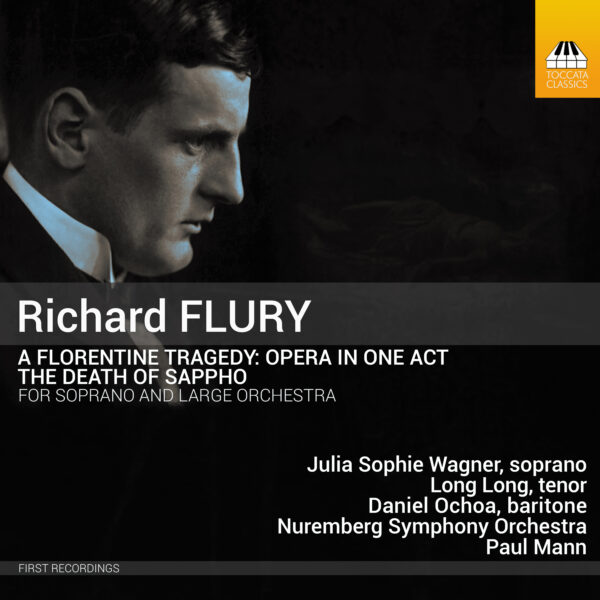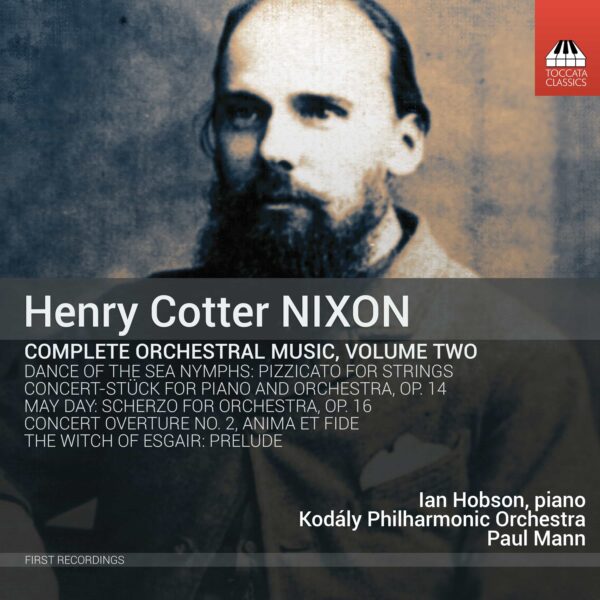Richard Flury: Der schlimm-heilige Vitalis, Opera in Five Acts
Der schlimm-heilige Vitalis (which can be translated roughly as ‘Lustful Brother Vitalis‘) was the last of the four operas by the Swiss composer Richard Flury (1896–1967). It was premiered in 1963, the year after its completion, and then remained unheard until this recording. The plot, based on a novella by Flury’s fellow Swiss, Gottfried Keller, sets jolly village life against religious intolerance and sexual politics in an unsettling blend of the sentimental and the cynical – although love, of course, triumphs in the end. Flury’s late-Romantic music redeems the libretto with a steady flow of memorable melodies, engaging solo and choral numbers, and colourful orchestration – and with a sense of fun never far from the surface.
Rebecca Nelsen, soprano
Marlene Gassner, contralto
Matthias Stier, tenor
Markus Eiche, baritone
Madrigal Choir of the Nuremberg University of Music
Alfons Brandl, chorus-master
Nuremberg Symphony Orchestra
Paul Mann, conductor
Listen To This Recording:
- Sinkende Sonne verlischt bald im Meere
- Ob Heid, Ob Christ, Ob Bürger, Ob Soldat
- Genug des Lärmens und des Tobens!
- Wie das Kätzchen auf dem Dache
- Ja, Jucunda
- Quies in coeli et in terra, et in nomine Dei!
- Ihr Leut’! Ein Trunk bis auf der Kanne Grund
- Bravo, Mönch!
- Aufzug der Wache
- Sinkende Sonne verlischt bald im Meere
- O sancta Maria, gratia plena!
- Wer klopft? Wer pocht zu später Zeit?
- Herein, Mann Gottes, keine Furcht!
- Lass mich, wiedriger Verfolger!
- Nun sage mir, erzähl’ mir rasch
- Sieh’ da! Mein einzig Töchterlein spaziert am frühen Morgen
- Herbei, Ihr Leut’ und seht was so ein Heil’ger sei!
- Hilf Gott, der Abt Sebastian!
- Freude, Freude, dass es so gekommen
- Nimm diesen Beutel Goldes noch
- Was, Fräulein, nun?
- Es ist die dritte Nacht
- Hat das Gewissen endlich Dich gezwackt?
- In jener Nacht, da meine Dienerin mich heimgebracht!
- Weiss selber nicht, wie mir geschah…
- Wirf dies Kleid von Dir, Geliebter
- Intermezzo: Larghetto
- Fest des Weines, Fest der Reben
- Auf zum Trunke, auf zum Wein!
- Hoch Vitalis, hoch die Braut
CD 1
Act One
Act Two
CD 2
Act Three
Act Four
Act Four
FIRST RECORDING





The Arts Fuse :
‘Fortunately, the work turns out to be delightful and pleasantly varied, not least in its many self-enclosed numbers, such as hymns and prayers […] that the smug monk sings to strengthen his determination, or the joyous wine-festival chorus that opens the final act […]. Flury’s music here is a fascinating mixture: its style is largely buoyant and High Romantic […] but with occasional modernist touches in the harmony. The orchestration is far more modest than in Wagner or Strauss, no doubt making it easier for the singers’ voices to come across to the audience. Phrase structure is often relatively square (that is, based on a four-measure norm). But this often applies mainly to the orchestral music, leaving the voices free to declaim the text in phrases of less predictable length, hence more naturally.
You can tell that the cast is strong when such an accomplished singer as Daniel Ochoa […] appears here, magnificently, in the small role of “the Monk” (another monk, not Vitalis). All four of the major roles are well taken. Each of the four gives continuous pleasure yet enunciates so clearly that I could often have written the words down by ear. The chorus (from the university in Nuremberg) likewise sings splendidly. […]
This opera, like so many others, is at once of its time and still timely. I hope the Toccata recording spurs opera companies — and college opera studios, because the vocal parts are not extraordinarily difficult — to bring this “bad-boy saint” to the stage. ‘
—Ralph P. Locke, The Arts Fuse
Fanfare :
‘I also enjoyed Paul Mann’s conducting, which has a brio I would appreciate in operetta. His singers are good, particularly true contralto Marlene Gassner as Jucunda, soprano Rebecca Nelsen as a winning Jole, and Markus Eiche as an ebullient Soldier.’
—Nicole De Sapio, Fanfare
Opera Wire :
‘Markus Eiche as the Soldier […] fills his introductory aria with charm and esprit. In “Wie das Kätzchen auf dem Dache” he demonstrates comedic intuition, delivering the high-tessitura romance with a delightful staccato leading up to the onomatopoeic repetition of “Ju-Ju-Ju-Jucunda.”
The Texan Rebecca Nelsen lends her youthful soprano to the witty character of Jole. Phrasing intelligently she creates the most dynamic portrayal of all the cast involved, lifting the youthful heroine beyond the gender-based stereotypes that a less incisive interpreter might otherwise have suffered from. Particularly, her ability to have the lightheartedness of her role prevail in true operetta-fashion is an achievement of itself […].’
[Matthias Stier] excels in the duets as well as in the cantabile of “O Sancta Maria” in which breath control and fine dynamic shading give a fair measure of his musicianship. He manages the part impeccably (it is by no means an easy one) and convincingly shows the transformation from religious zealousness to secular desire embedded, that is, within the matrimonial context of his love for Jole.
Finally, the concise but no less spirited conducting of Paul Mann leads the Nuremberg Symphony Orchestra to give a crystal-clear performance […].’
—Bob Dieschburg, Opera Wire